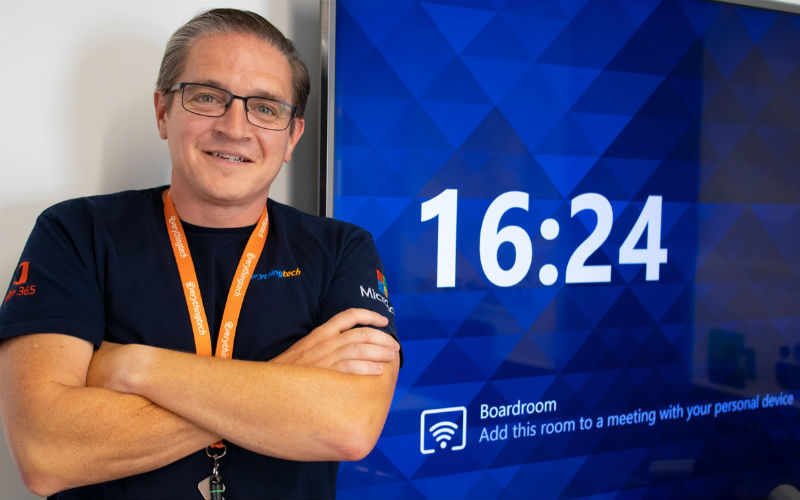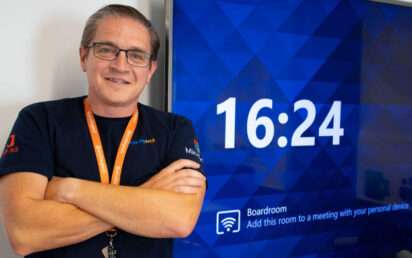Lee Wrall is the sales and marketing director at Manchester-based Microsoft partner Everything Tech and said companies had to do more than just send staff home to work with no help.
“A lot of people are sending their workforce home and expect them to be able to work from home without any challenges,” he said. “I still don’t think enough companies are putting in enough consideration on how these people are working.
“Every Zoom or Teams call I go on I still see people working from their couch and from their kitchen table and that can’t be good. From a legal perspective I’m convinced there will be a raft of neck injury claims coming up after this.
“At what point do employees say to their employers ‘you need to pay for my internet connection because 70 per cent of the use of is for work?’”
Wrall also said there had been a spike in phishing attacks on people working from home.
“We do quite a lot of cyber security awareness training,” he said. “The stats have been astonishing. It’s about constant awareness. You’ve got to drill it into people every day.”
Sarah McDowell is the owner of The Leader Centre and advises senior business leaders. She said businesses need to focus on boosting productivity.
“If we look back at the last decade face-to-face working hasn’t made us any more productive,” she said.
“I don’t know any senior people who aren’t at full capacity all of the time but we haven’t managed to get any more productive. I think part of the problem has been the way we’ve worked face-to-face.
“Senior people have become very busy and they’ve become something of a bottleneck because they physically can’t do more. We now have this opportunity to say ‘how do we do things differently?’
“When we’re most successful is not when we do more but when we get an extra 5,10, 50 or 100 people to contribute more. If we get the set-up right you’ll find people are more productive when they work remotely.
“As a nation we’ve become obsessed on the amount of time people spend in a business and ultimately that doesn’t matter a jot if the results are not being delivered. I talk about managing results and not people.”
Tracey Threlfall is the managing director for AON in the North and said Covid has changed the way we work forever.
“I’ve always been an advocate of output,” she said. “It’s not about how many hours you work in the office. I think the biggest challenge with my team across the North is stopping them working too many hours because they’ve converted their commute time into extra hours.
“The IT has been pretty good. We gave individuals a budget so they were comfortable at home. We’ve paid for things like boosters and whatever was best for them.”
Before Covid Threlfall regularly spent four hours a day on the road covering the North and has enjoyed working from home.
“I was doing 22,000 miles a year before lockdown,” she said.
“The company car I was going to invest in is now a garden office. That’s what I’ve spent the money on and I’m not going back. I think the future will be a hybrid model.”
Architect Duncan Dalzel-Job is a WfH design specialist at Rethink Home Working and said things like lighting, temperature and layout were critical to working from home effectively.
“I think there are only certain companies who realise how important the wider home working environment is,” he said.
“Noise is a classic problem. Companies are becoming more aware of it. One thing I’ve seen in Germany is they’re beginning to legislate about working from home. Remote working is here to stay.
Heather Parsons is the owner of The ENERGYBODi Sensation and has seen an increase in work-related injuries caused by people working from home.
“Tech neck is definitely becoming more prominent,” she said.
“A good posture isn’t a static posture. A good posture is a moving posture. One of the things we’re recommending is the big wobble cushion.”
Warren Middleton is the managing partner at KPMG in Manchester, where the average age of their 1,250 staff is 27. He said protecting staff’s mental health was really important.
“More and more of these (young) people are living back at home,” he said.
“Occupancy rates of flats in Manchester are down as people have moved back in with their parents. He said KPMG had carried out additional training and testing around cyber security and warned companies not to advertise when senior members of staff go down with Covid because they could be targeted by cyber criminals.
Neil Rogerson is a client relationship manager of recruitment firm Robert Walters and said after a difficult April business bounced back in May, June and July with a lot of senior recruitment taking place.
However he said one impact of working from home was that it was harder for new hires to create an ‘emotional connection’ with a company when they weren’t in the office.
Ceri Henfrey is the head of operations at outsourced communications provider Moneypenny, which handles 55,000 client interactions a day.
In 2018 the company invested £15m in a new HQ in Wrexham, complete with treehouse meeting room, pub, sun terrace and subsidised restaurant.
The office was designed to be the “happiest workplace in the UK” and Henfrey said the movement to working from home had been a steep learning curve as they looked to protect the company’s culture.
James Hall is the business development manager of 02 franchise MID Communications and praised the leadership of CEO Danny Simpson during the pandemic. “We were early adopters of things like Microsoft Teams,” he said.
“As a business Danny is all about the people. He makes sure every team member has everything they need and protects their mental health.”
The other speakers were Tracey Wood, head of business development at Rochdale’s Hopwood Hall; Sue Hutchinson, partner at accountants Beever and Struthers; and Karen Bexley, founder and partner at law firm Bexley Beaumont, which stays in touch with staff through walking meetings.

